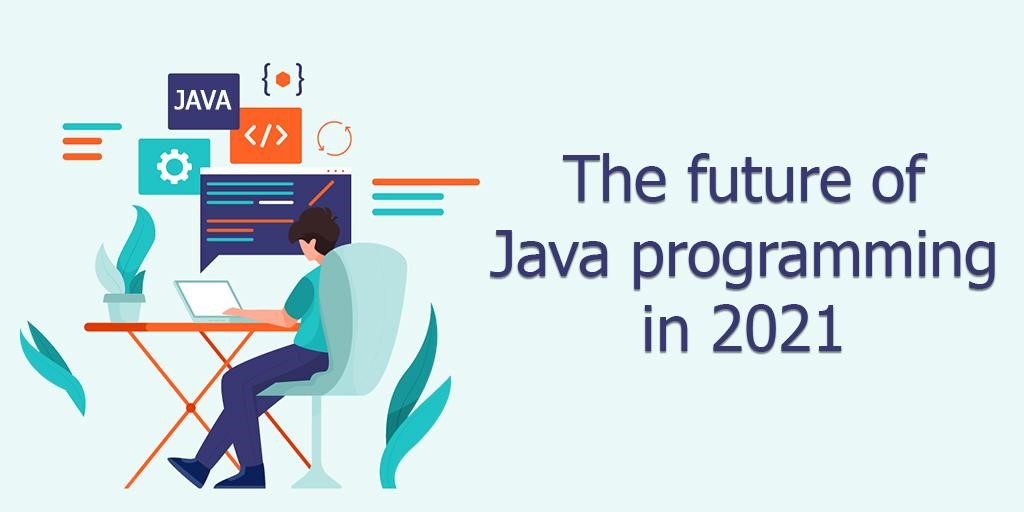
The future of Java Programming in 2021
In 2024, the global developers’ Java Programming community is predicted to grow by 28.7 million people. And 63.1% of programmers would prefer to use Java, Python, HTML/CSS, and SQL in the future. Moreover, big corporations such as Google, Microsoft, and Amazon continue to use Java in their software development processes.
Java is an object-oriented Java Programming language with a lot of power. This technology has gone through 17 iterations since its introduction in 1991, including JDK Beta, Java SE 7, and others. The most recent version Java SE 15, was published on September 15, 2020.
Despite having a plethora of alternatives, well-known organizations like Spotify and Twitter continue to use this programming language.
Some of the key features of Java programming
- Simplicity
Java has a straightforward syntax that is based on C++. This programming language is also simple to develop and comprehend.
- Object-Oriented
This capability means that a Java developer can organize software as a collection of objects, such as classes while coding.
- Platform Independent
The Java virtual machine, which is stored in random-access memory, receives a unique bytecode generated by the Java compiler. Java code can be executed in Linux, Microsoft Windows, etc.
- Multi-Threaded
It’s one of Java’s most powerful features. It means that programmers can construct multi-threaded programs (two or more) that can run at the same time.
- Architecture-Neutral
Because a compiler generates bytecode that does not interface with specific computer architecture, Java has a neutral architecture.
- Robust
Java features a robust type checking system that emphasizes time error and runtime error checking.
- Distributed
Java is a distributed programming language, which means it may be used over multiple computer networks.
Key benefits of Java programming
If you’re not sure whether you need to code your app in Java, consider the following benefits:
- A significant development community
After Python, SQL, HTML, and JavaScript, Java is the fifth most common programming language. It is used by approximately 40.2% of developers. So, if you need to recruit Java developers for your app projects, you’ll have no trouble finding them.
- A Straightforward Learning Curve
In comparison to other programming languages such as C++ and C, Java is simple to code, debug, and build.
- Extremely portable
The Java code is compiled into bytecode that may run on a variety of systems, including Windows, macOS, Solaris, and others. Java offers three different types of portability:
- OS/GUI is a function that communicates between the operating system and the graphical user interface.
- Java’s source code portability allows it to generate the same results regardless of the operating system, Java compiler, or other factors.
- The process of creating object code for a CPU architecture is known as portability (a bytecode).
Contemporary technologies of Java
Java continues to be one of the most popular programming languages on the market. Around the world, up to 54% of developers use it in the deployment process. If you’re curious about what technologies are gaining traction right now and whether or not they can replace Java, read on:
- Python
Python is the world’s most popular programming language. It is used by around 25.95% of developers. Python’s success is due to its great library support for developing web applications. Java was the programming language used to create Instagram, Pinterest, Youtube, and other well-known apps.
Python is mostly utilized in data science to perform sentiment analysis and predictive algorithms in the gaming and customer service industries. Because Java cannot be implemented in these sectors, Python will not be able to replace it in the future.
- Kotlin
Kotlin is a 2016 open source programming language that was first released. Google named it one of the most popular languages for Android development in 2019. Because Kotlin is a relatively new technology with a tiny development community, it may be difficult for it to overtake Java soon.
- Scala
Scala is a multipurpose programming language that supports both functional and object-oriented programming. It was designed in the early 2000s by Martin Odersky, a German computer scientist. Scala has many advantages, including a straightforward syntax and excellent Java virtual machine compatibility.
- Swift
Apple.Inc. created Swift, an open-source programming language. It was first made public in 2014. Swift is exclusive to the iOS, macOS, tvOS, and watchOS platforms. As a result, it’s impossible to predict whether this technology will supplant Java.
- PHP
PHP is a scripting language that is free and open source. Rasmus Lerdorf, a Canadian-Danish programmer, created it in 1994. PHP is a programming language that is primarily used in web development. Simple web app maintenance, performance, and integration are just a few of the advantages. PHP is a fantastic choice for web app development because of these characteristics.
It’s an object-oriented programming language that’s open-source, just like Java. However, PHP cannot completely replace Java because it is primarily used in small applications.
Reasons that make Java a more useful language:
- Because of its dynamic nature, it’s an ideal choice for designing streaming apps.
- Java is still utilized in web development, mobile development, big data, IoT (Internet of Things), blockchain, and AI.
- FaaS (function as a service) and serverless programs with comprehensive functionality are possible to create.
- Java stays up with the times and releases new versions more frequently than it did a few years ago. For example, only 6 months after Java 14, Java 15 was launched. It took up to 5-6 years in previous versions of Java, such as Java 8-13.
- Java is still used in the development processes of AirBnb, Uber, Netflix, and other tech heavyweights.
You learned about the major characteristics of Java, its benefits, current upgrades, and the technology’s future in our post. We also compared it to other cutting-edge languages such as Python, Kotlin, Scala, Swift, and PHP.
Java will continue to exist in the future due to its big developer community, simple learning curve, exceptional portability, and use in significant projects such as Pinterest, Google, Uber, and others.
So, if you want to start your career in the IT industry learning this skill will help you gain better career opportunities. Learn Java with the Java programming course offered at uCertify to master the skills!




